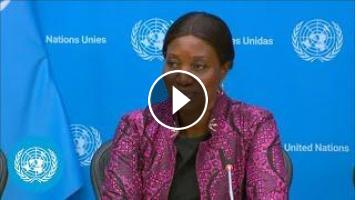The UN senior humanitarian official Edem Wosornu told reporters that the humanitarian situation in Afghanistan is “fragile,” adding that 23 million people are in need of humanitarian assistance this year - five times the number in 2019.
________________________
The UN senior humanitarian official Edem Wosornu briefed reporters on her recent visits to Afghanistan and Pakistan and Sudan.
On Afghanistan, Wosornu said, “the humanitarian situation in Afghanistan is fragile, 23 million people are in need of humanitarian assistance this year. This is five times the number in 2019.”
She added, “the majority of people in need are women and girls, children in Afghanistan. Women and girls represent more than 1.4 million girls who are directly affected by the ban on female schooling after grade six, this is a huge concern to say the least.”
The senior humanitarian official also said, “Restrictions on Afghan female workers have added a layer of complexity to the humanitarian operation.”
She continued, “while delivering humanitarian assistance our courageous Afghan female colleagues face many challenges and assume personal risks every day to and from work.”
Wosornu saluted to the humanitarian workers for their bravery and “commitment to supporting females across the country and males in need.”
On Pakistan, the OCHA official said, “I saw firsthand the impact of flooding on children, their inability to wade through the flooded waters and go to school. I saw the impact of flooding on families who are agricultural families who could not who had lost crops. This has a significant impact on the economy obviously.”
She added, “The Government of Pakistan was also in the emergency centre in Islamabad, where they are trying their best to ensure that predictability is key where they can prevent massive loss of life from the early warning systems and they asked us to support them.”
Wosornu reiterated, “if you see the impact of the climate crisis on communities, it's very clear that something needs to be done.”
Moving on to Sudan, the UN humanitarian official said, “The people of Sudan and trapped, the people of Sudan are suffering and I think it's worth reminding us of a few stark numbers - 18 million people face food insecurity, acute hunger, IPC Phase three and four; 5 million of them are step away from starvation, 5 million people the number unfathomable.”
She continued, “Behind every number is a face, a person, is a name, is a child, a father and mother. Let's not forget that. The risk of famine is clear in Darfur, in Kordofan, in Khartoum. Nine million people are being forced to flee to other parts of Sudan or neighboring countries. Human rights violations are rampant.”
Wosornu also said, “I witnessed insecurity. I witnessed systematic obstructions, I witnessed of course firsthand, funding gaps that are causing us not to be able to assist cross border cross line important in terms of access and safe deliveries.”
She concluded, “More than anything, people I met said that we need to stop the war, it needs to stop, they need to go back to their lives.”
________________________
The UN senior humanitarian official Edem Wosornu briefed reporters on her recent visits to Afghanistan and Pakistan and Sudan.
On Afghanistan, Wosornu said, “the humanitarian situation in Afghanistan is fragile, 23 million people are in need of humanitarian assistance this year. This is five times the number in 2019.”
She added, “the majority of people in need are women and girls, children in Afghanistan. Women and girls represent more than 1.4 million girls who are directly affected by the ban on female schooling after grade six, this is a huge concern to say the least.”
The senior humanitarian official also said, “Restrictions on Afghan female workers have added a layer of complexity to the humanitarian operation.”
She continued, “while delivering humanitarian assistance our courageous Afghan female colleagues face many challenges and assume personal risks every day to and from work.”
Wosornu saluted to the humanitarian workers for their bravery and “commitment to supporting females across the country and males in need.”
On Pakistan, the OCHA official said, “I saw firsthand the impact of flooding on children, their inability to wade through the flooded waters and go to school. I saw the impact of flooding on families who are agricultural families who could not who had lost crops. This has a significant impact on the economy obviously.”
She added, “The Government of Pakistan was also in the emergency centre in Islamabad, where they are trying their best to ensure that predictability is key where they can prevent massive loss of life from the early warning systems and they asked us to support them.”
Wosornu reiterated, “if you see the impact of the climate crisis on communities, it's very clear that something needs to be done.”
Moving on to Sudan, the UN humanitarian official said, “The people of Sudan and trapped, the people of Sudan are suffering and I think it's worth reminding us of a few stark numbers - 18 million people face food insecurity, acute hunger, IPC Phase three and four; 5 million of them are step away from starvation, 5 million people the number unfathomable.”
She continued, “Behind every number is a face, a person, is a name, is a child, a father and mother. Let's not forget that. The risk of famine is clear in Darfur, in Kordofan, in Khartoum. Nine million people are being forced to flee to other parts of Sudan or neighboring countries. Human rights violations are rampant.”
Wosornu also said, “I witnessed insecurity. I witnessed systematic obstructions, I witnessed of course firsthand, funding gaps that are causing us not to be able to assist cross border cross line important in terms of access and safe deliveries.”
She concluded, “More than anything, people I met said that we need to stop the war, it needs to stop, they need to go back to their lives.”
- Category
- United Nations
- Tags
- UN, United Nations, UNGA
Be the first to comment













